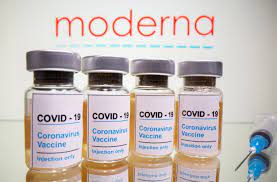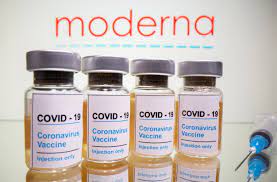
Its Covid-19 vaccine was about 93% effective through six months after the second dose, said Moderna Inc on Thursday and the study by the company has shown that there was hardly any change in the 94% efficacy that was reported in the original clinical trial of the vaccine.
In comparison, the vaccines from Pfizer Inc and BioNTech SE were found to lose 6 per cent of their efficacy every two months – ultimately declining to about 84 per cent six months after the second shot, showed data released last week by the companies.
Messenger RNA (mRNA) technology has been used in both the Moderna and Pfizer-BioNTech vaccines.
"Our COVID-19 vaccine is showing durable efficacy of 93% through six months, but recognize that the Delta variant is a significant new threat so we must remain vigilant," Moderna Chief Executive Stéphane Bancel said.
However, the company stressed on the need for a booster dose of the vaccine prior to the winter season as levels of antibodies were likely to come down.
This latest disclosure was made by the company following public health officials all over the world debating on the safety, efficacy and need for additional doses of Covid-19 vaccines, even as many countries are struggling with the Delta variant of the coronavirus.
Other reports say that authorization for a third shot will be sought by Pfizer later this month even as some countries such as Israel have already started to or are planning to begin administering additional shots to older or vulnerable people.
In a separate communication, Moderna said robust antibody responses against variants, including the Gamma, Beta and Delta variants, were shown by three different booster candidates that were studied by the company.
After a booster dose of the vaccine, the total level of Covid-19 neutralizing antibodies got close to the levels observed after administration of the second dose.
Total vaccine contracts worth about $20 billion in for this year have been signed by Moderna and the company said that it aims to manufacture between 800 million and 1 billion doses.
Contracts for supplying vaccines worth $12 billion for 2022 have been secured by the company with the potential for another roughly $8 billion in sales and expects through the production of between 2 billion and 3 billion doses next year.
However, the company has lagged behind in the rate of production compared to its much larger competitor in this segment Pfizer which is expected pot produce as many as 3 billion doses this year which are expected to generate sales revenues of more than $33.5 billion.
Emergency usage authorization among adults was granted to Moderna's vaccine in the United States in December last year and since then more than 50 countries around the world have given emergency use authorization for the vaccine from the company.
The process for filing for full approval of the vaccine with the U.S. Food and Drug Administration was started by the company in June this year and is expected to complete its submission in August.
(Source:www.economictimes.com)
In comparison, the vaccines from Pfizer Inc and BioNTech SE were found to lose 6 per cent of their efficacy every two months – ultimately declining to about 84 per cent six months after the second shot, showed data released last week by the companies.
Messenger RNA (mRNA) technology has been used in both the Moderna and Pfizer-BioNTech vaccines.
"Our COVID-19 vaccine is showing durable efficacy of 93% through six months, but recognize that the Delta variant is a significant new threat so we must remain vigilant," Moderna Chief Executive Stéphane Bancel said.
However, the company stressed on the need for a booster dose of the vaccine prior to the winter season as levels of antibodies were likely to come down.
This latest disclosure was made by the company following public health officials all over the world debating on the safety, efficacy and need for additional doses of Covid-19 vaccines, even as many countries are struggling with the Delta variant of the coronavirus.
Other reports say that authorization for a third shot will be sought by Pfizer later this month even as some countries such as Israel have already started to or are planning to begin administering additional shots to older or vulnerable people.
In a separate communication, Moderna said robust antibody responses against variants, including the Gamma, Beta and Delta variants, were shown by three different booster candidates that were studied by the company.
After a booster dose of the vaccine, the total level of Covid-19 neutralizing antibodies got close to the levels observed after administration of the second dose.
Total vaccine contracts worth about $20 billion in for this year have been signed by Moderna and the company said that it aims to manufacture between 800 million and 1 billion doses.
Contracts for supplying vaccines worth $12 billion for 2022 have been secured by the company with the potential for another roughly $8 billion in sales and expects through the production of between 2 billion and 3 billion doses next year.
However, the company has lagged behind in the rate of production compared to its much larger competitor in this segment Pfizer which is expected pot produce as many as 3 billion doses this year which are expected to generate sales revenues of more than $33.5 billion.
Emergency usage authorization among adults was granted to Moderna's vaccine in the United States in December last year and since then more than 50 countries around the world have given emergency use authorization for the vaccine from the company.
The process for filing for full approval of the vaccine with the U.S. Food and Drug Administration was started by the company in June this year and is expected to complete its submission in August.
(Source:www.economictimes.com)














